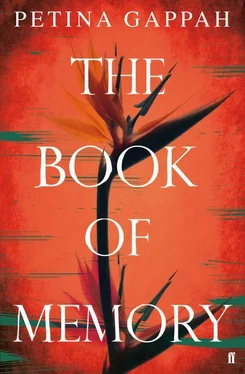‘As if I would not know my own peaches,’ she said.
I knew that I was in fifty thousand kinds of trouble, but I could not bring myself to name Nhau. He was the most popular of the children, the most playful, the most daring, and the acknowledged leader of the Mharapara Street children.
Perhaps, even now, the other children were congratulating him as they ate the fruit of his exploits. I could not name him. If I did, the other children would never talk to me again. So I did not say what had happened. I could only protest that I had stolen no peaches, that I had only seen the peaches fall, and that I was no thief.
As with anything in the township, our contretemps attracted attention. Soon, there was a small gathering of onlookers, with each person giving their opinion about how guilty I looked and was. I could hear the whispers, ‘Aba mapichisi, aba mapichisi.’ In the middle of all of this, my father came back.
MaiNever dragged me to my father and said, ‘Your daughter is a thief.’
My father only asked me, ‘Where is Mobhi?’
I looked down. I could not answer.
My father then ran into the house. MaiNever still held my arm, and yelled about her peaches as she followed my father to MaiPrincess’s house.
‘Where is Mobhi?’ he asked.
‘She said she was hungry and went back to your house,’ MaiPrincess said.
MaiNever still held me by one hand and in the other she held the incriminating peaches. I saw Nhau in the crowd of people, smirking among the children. I could almost feel the peaches in his stomach. I imagined him sharing them with the other children, while letting me take the blame. My eyes welled up with angry tears.
I could hear my father calling out for Mobhi. My rage against Nhau gave me strength. I managed to break free from MaiNever’s grip, and ran to hide in the outside bathroom behind the house. She ran behind me, still shouting. I opened the door and was about to shut myself in when I stopped. MaiNever also stopped behind me.
In the silence that followed, she let out a piercing scream.
My father ran out of the house.
From a very long distance, I heard MaiWhizi shout, ‘Chii chiiko, zvadiniko veduwe?’ Other neighbours followed to where I stood in stiff silence as MaiNever continued to scream.
My father moved me out of the way and there was Mobhi, or at least, there were Mobhi’s legs, because all I could see of her were the legs sticking out of the large zinc bucket that was used to store the water for flushing if there was none in the tank.
I looked for a long time at her feet.
They were brown with dirt even though she was in the water. Then there was noise and confusion behind me, as my father took her out of the water and tried to breathe life into her while he called her name.
MaiNever and MaiWhizi had their arms around each other as they wailed in counterpoint. My mother came out of the house. When she saw Mobhi, she hit my father on his back with her fists. My father struggled to get her to stop.
He pushed too hard. She screamed, fell against the wall near the door and cut her head. Joyi began to cry from the sight of the blood.
My mother got up. She fought against my father’s restraining arms. She slipped in the water and hit her head against the doorjamb. Her head bleeding, she ran weeping to the house next door. She picked up the front of her dress and covered her face, and everyone could see that she wore her black petticoat with the hole where the iron had singed it.
MaiPrincess came and then all the other neighbours came. The women joined my mother in keening and the lament spread from house to house in the street until everyone in Mharapara and as far as kwaMhishi knew of Mobhi’s death.
In all of the confusion, I remember one thought: this meant that people would soon forget about the peaches. I was right. No one mentioned the peaches again, not even MaiNever. My father took us to MaiWhizi’s house. She took me in her arms, and hugged me to her. I could smell the sweat of her armpits and from her skin the cloying and overpowering smell of camphor lotion.
*
Mobhi’s wake lasted four days and three nights. During that time, our neighbours and the people from the Church of the Felicitous Tidings of the New Gospel filled up our house, cooked outside and sang. My mother and MaiSheila sat and wept together, rocking back and forth as they held each other. Joyi and I did not sleep at home.
We remained at MaiWhizi’s until the day we buried Mobhi. On the day of the funeral, I went with my parents and the others on a bus to the cemetery in Highfield. Only a year before, we had walked these same streets, in our Christmas clothes, going to get our picture taken by Bester Kanyama, Mobhi in her pink lace dress seeing everything from my father’s shoulders.
My mother should not have been at the graveside. There is a tradition according to which the person most touched by a death is not to see the burial. My mother was supposed to come only to see the grave after the burial, and not to witness the burying itself.
My mother refused to stay in the house, so my father gave in to her. I kept my eyes focused, not on the little coffin that was covered in dirt, but on MaiWhizi, who was dancing at the grave in time to the beating of the drums. When Mobhi’s coffin was lowered into the ground, my mother tried to jump after it. My father hid my face against himself, but I could still see my mother struggling to jump in before she went suddenly limp. Even when the men from the funeral place threw gravel over Mobhi, she simply stared, and continued in the same position until the entire grave had been filled up.
It was only when Mobhi died that I realised that we had no relatives. I overheard MaiWhizi ask MaiPrincess, ‘And just where are all their relatives? What is this new fashion of being buried only by neighbours and church people? There are no aunts here, no uncles, no grandparents?’
‘It is as though they had just sprang from the earth,’ said MaiPrincess.
‘They have never received any visitors, not once as long as they have lived here,’ said MaiWhizi. ‘I have never seen a single aunt or uncle, sister or brother.’
‘Not even an in-law, and you know how you can never get rid of those.’
‘And they go nowhere in planting season.’
‘Maybe they just have nowhere to go.’
They were right. Our neighbours had endless uncles and aunts, cousins and grandparents forever coming to stay. In six months alone, for instance, all of MaiWhizi’s relatives would have visited.
In the holidays, instead of going to a rural home like the other children, we stayed at home, like the Manyasarandi and Bhurandaya families from Malawi or Mozambique, who everyone said were born rukesheni , belonging to the townships and with no proper home, and who had to be buried in the cemetery in town.
No relatives ever came to us from the village, or from anywhere else. We seemed complete in ourselves, with no one ever coming, no aunts, uncles or nephews. At the time, I did not notice it, but I have wondered since then why we were so unconnected to anyone else but ourselves.
It made sense to me that we were from Malawi, which I knew was another country that was far away. In the invincible confidence of my new knowledge, I marched up to the two women and said, ‘They are in Malawi; everyone is in Malawi.’
My father came up to me and I turned to him eagerly and said, ‘Baba, tell them. Tell them about Malawi. They are asking where our relatives are, but they are in Malawi, aren’t they, Baba, aren’t they? They are in Malawi.’
My father said only, ‘Memo, go inside.’
As I walked away, MaiWhizi laughed, a high, nervous sort of laugh, and said, ‘Ah children. When they overhear something, they don’t always understand it.’
Читать дальше












